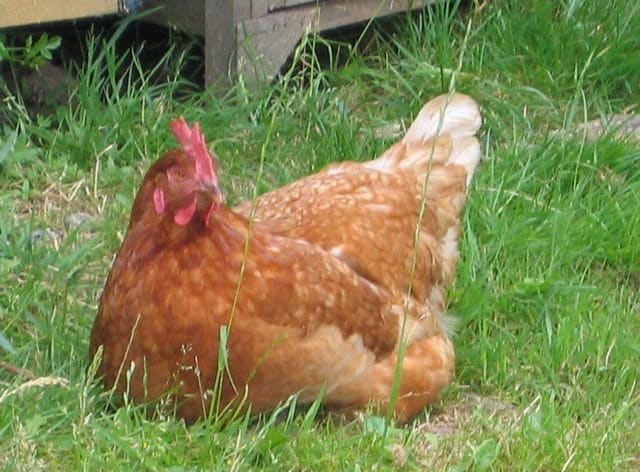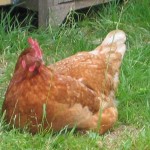Pet Advice Guides for Pet Owners
Chickens and eggs
This hen is a Warren and will always lay a pale brown egg. The colour of the egg is determined by the breed although many people think that free range hens lay brown eggs and intensively kept hens lay white eggs – this is not so – the way they live has nothing to do with the colour, shape or size of the egg. If you keep a mixed breed batch of hens you will get eggs of different shades – dark brown, speckled, pure white, pale pink and every shade in between, even china blue and pale green, although these are rare. A box of ordinary coloured eggs will never be the same.
The colour of the outer shell doesn’t affect the taste of the eggs, they are all the same inside. An egg takes around 25 hours to form inside the hen and this is a continuous process. When a hen lays an egg there is another coming up to full size and ready to be laid the next day and another smaller one behind that and so on. A cockerel isn’t necessary, the hen will lay whether she is mated or not. Of course her eggs won’t be fertile – although she will not realise that and will often go broody and try to sit them. If you don’t have a cockerel and they’ve not been fertilised, they’ll never hatch out no matter how long she sits on them.
It’s not unusual for a crossbreed such as a Warren to lay an egg for over 300 days of the year. You’ll get less from the pure breds though, around 250 if you are lucky. Every year the hens start to moult, they lose their feathers and look very raggedy. It lasts about six weeks and during this time you won’t see any eggs. When the moult is over and their feathers start to grow again, they will come back into lay.
It’s lovely to see a basket of differently coloured eggs on the table and many people select their hens for the quality and colour of their eggs. A hen who lays a beautiful dark brown speckled egg is one to breed from, if she hatches chicks and they are pure bred, you will surely want to keep some of the pullets (young female hens). In the U.K. we prefer the brown speckled eggs, in Europe and the USA, the pure white eggs are liked best. The Maran breed lays lovely dark brown speckled eggs, by contrast, the Light Sussex lays a pure white egg. Auracanas, which are beautiful lavender coloured hens, lay blue eggs, sometimes a green shade although these are not as much liked as the perfect pale blue. If you’re buying hens it’s nice to know what colour eggs they lay. Buff and pink coloured eggs are lovely too.
Eggs are full of goodness and make a nutritious meal. They contain only 10 per cent fat, 10 per cent protein, 10 per cent minerals and the rest is made up of water. They also have eight essential amino acids plus vitamins A, B, D and E and they are only 75 calories. When young birds begin to lay the eggs will be small – these are pullet eggs and are much sought after, it’s believed they are especially rich. As hens get older they lay larger eggs, as they turn into senior citizens they will lay less and less. We don’t hold that against them though, our rescued sanctuary hens have a long and happy life – it’s old age gets them in the end. Hens always lay more eggs in summer than winter, this is because of the daylight hours. When the nights are longer the hens sometimes stop laying all together. In commercial poultry units it’s common practice to keep lights on for long hours, sometimes all the time. It’s to get the hens to think it’s summertime and lay more. It’s unnatural and wears them out. Who would want to be forced to live under bright lights? If hens have a fright or a change in circumstances they’ll stop laying.
We have been rescuing intensively kept poultry for over thirty years. It’s lovely to see the pathetic wrecks blossom out into healthy birds in only a few weeks. They have such a short life when they are intensively farmed and are still young when they are discarded and sent for pet food. Yes, that’s what’s in the cans and pouches. We often have hens needing new homes so please get in touch if you want a new feathered friend. Our aim is to rescue more hens and turkeys this year and any help you can give us would be greatly appreciated. [donate]


